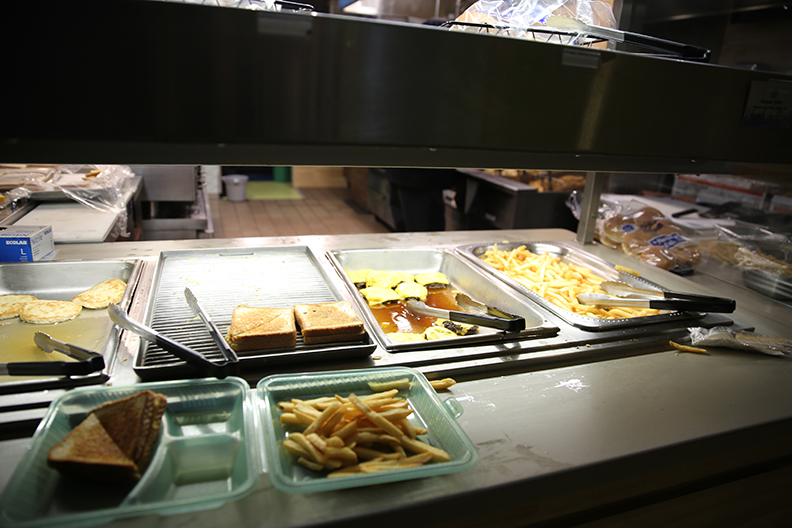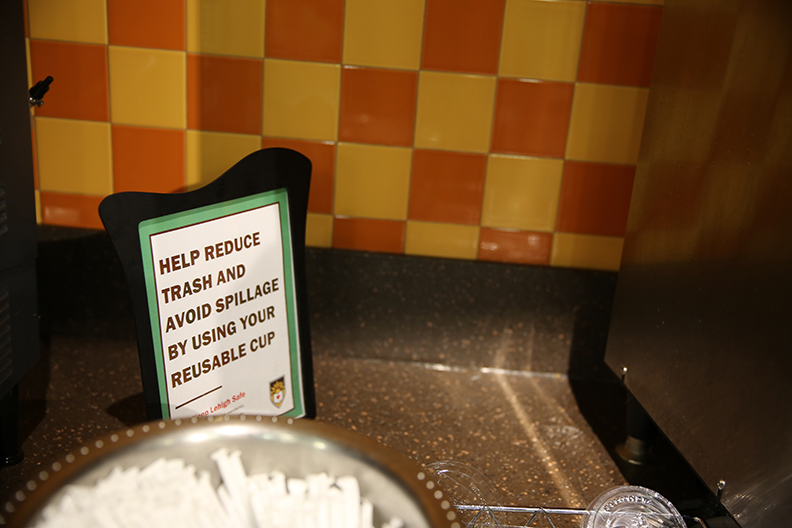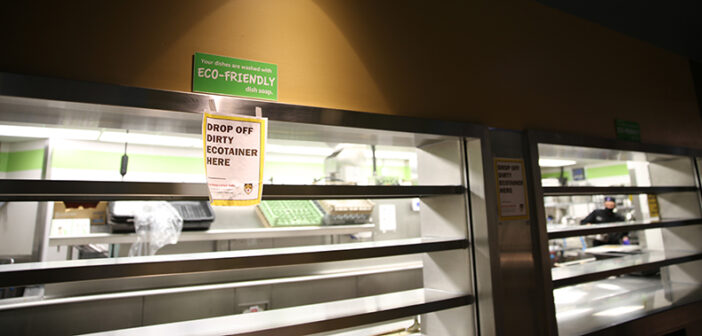Lehigh won the National Wildlife Federation’s (NWF) Campus Race to Zero Waste case study competition in the waste minimization case study category for the fall of 2021.
Campus Race to Zero Waste is a college and university waste reduction competition promoting waste minimization and recycling activities on college campuses, according to the NWF website.
More than 1,100 colleges and universities from the U.S. and Canada submitted case studies, which were judged across four categories: waste minimization, food waste reduction, education and awareness, and summary of waste minimization efforts over one year or more.
Five colleges and universities were recognized among these categories for various waste reduction and recycling activities. Lehigh’s winning case study detailed the Eco Container Program.

A student is holds an eco-friendly cup provided by the school cafeteria at Rathbone Hall on Jan. 31. The cups have a green eco-friendly logo on them, reminding students to contribute to the environment. (Junying Wu/B&W Staff)
Eco containers are reusable clamshell takeout containers. As stated on the Lehigh Sustainability website, the Eco Container Program has been in place at Lehigh for many years. However, Lehigh Dining announced in spring 2021 that all meal plan participants would be automatically enrolled in the Eco Container Program.
In fall 2020, 83,250 disposable clamshell containers were used and thrown away on campus. This waste would stretch the length of the Goodman Stadium football field 173 times.
In spring 2021, 14,985 disposable clamshell containers were used and thrown away on campus because students actively used eco containers, as shown in the key highlights of the campaign. This waste would stretch the length of the Goodman Stadium football field 49 times.
Lehigh Sustainability Officer Katherine Targett Gross said she works to reinforce the impact of reducing waste on campus.
“While many colleges and universities around the country have shifted to single-use, disposable food containers in the wake of the COVID-19 pandemic, Lehigh expanded the reusable Eco Container Program,” Gross said.

A wide variety of food is available at Rathbone dining hall. Students can pick their own food with buffet-style serving after receiving their eco containers upon entry. (Junying Wu/B&W Staff)
Gross said Lehigh’s success is drawing the attention of other institutions, allowing them to see how they can model their Eco Container Programs after Lehigh.
Lauren Sleeger, director of Rathbone dining hall, said Lehigh stands as a role model for other programs. She said organizations like the Post-Landfill Action Network and the United Nations Little Book of Green Nudges have reached out for more information.
The use of eco containers not only requires responsibility from students, but from Rathbone staff who are maintaining the containers.

A prominent sign by the self-serve beverage machine in Rathbone Hall. Students are encouraged to use reusable cups for their drinks. (Junying Wu/B&W staff)
Sleeger said staff members had to adapt to a high return rate of containers by using more drying racks.
Sleeger said the Eco Container Program is “no small feat,” as polystyrene containers are still being used, although an ample supply of eco containers are offered.
“The use of the polystyrene containers is a sad decision we were forced to make in order to keep up with the demand. There are still a large group of students that do not choose to utilize the containers,” Sleeger said.
Audrey McSain, sustainability program manager, said she advocates for building strength in numbers when it comes to use of the eco containers.
“It is hard to get widespread buy-in on initiatives sometimes, but we have data that shows the student body’s support,” McSain said.
She said the use of these containers shows how individual actions can build to make a broader impact.






Comment policy
Comments posted to The Brown and White website are reviewed by a moderator before being approved. Incendiary speech or harassing language, including comments targeted at individuals, may be deemed unacceptable and not published. Spam and other soliciting will also be declined.
The Brown and White also reserves the right to not publish entirely anonymous comments.
1 Comment
“The use of the polystyrene containers is a sad decision we were forced to make in order to keep up with the demand. There are still a large group of students that do not choose to utilize the containers,” Sleeger said. There are more than a few people who obtain a perverse pleasure from irritating others, and they know this is an irritation; but it is minor compared to masking.